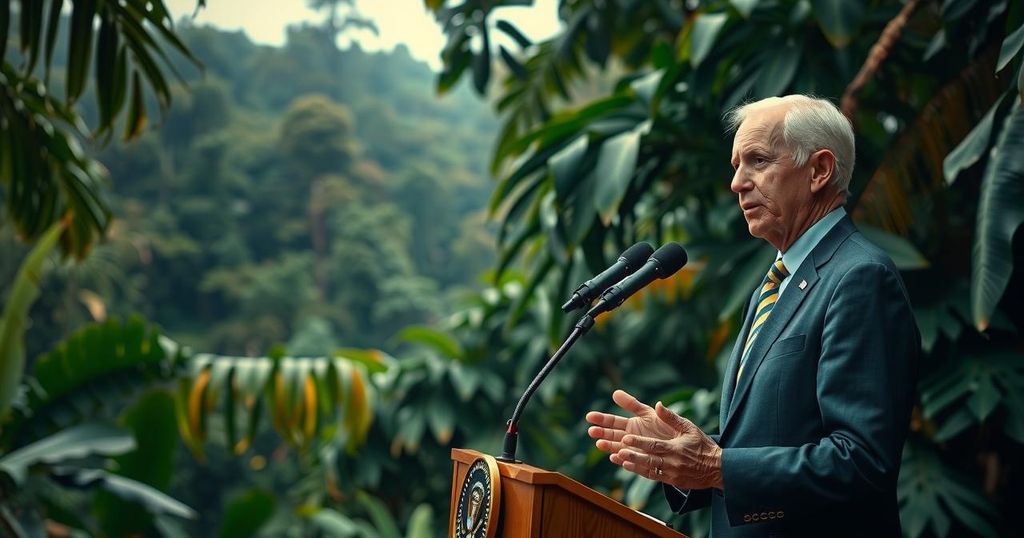President Biden’s historic visit to the Amazon rainforest underscores his administration’s commitments to fighting climate change and harnessing clean energy as an economic opportunity. He announced enhanced climate financing and investments, notably $50 million for the Amazon Fund, amidst concerns about future U.S. climate policies under President-elect Trump. Biden’s emphasis on bipartisan support for clean energy reflects a broader international strategy to address climate issues effectively.
U.S. President Joe Biden embarked on a significant trip to Brazil, becoming the first sitting American president to visit the Amazon rainforest. This visit, described by the White House as an opportunity to underscore Biden’s climate change efforts, aimed to highlight economic competition in the transition to clean energy. In Manaus, the capital of Amazonas, he announced increased U.S. climate financing, surpassing $11 billion for international efforts by 2024, which is critical to supporting initiatives in developing nations. While visiting a nature reserve, Biden emphasized the urgent need to confront climate change, stating, “The fight to protect our planet is literally a fight for humanity for generations to come. It may be the only existential threat to all our nations and to all humanity.” He announced U.S. investments in various climate initiatives, including $50 million for the Amazon Fund, and engaged with Indigenous leaders and local environmental advocates during his helicopter tour of the jungle. Biden’s visit happened amidst concerns regarding the fate of U.S. climate policies under President-elect Donald Trump, who has a history of opposing climate initiatives. Biden asserted confidence in the momentum towards clean energy in America and expressed hope that his successor would build on the foundation laid during his administration. He warned that while some may attempt to obstruct progress, the transition towards renewable energy holds bipartisan support and presents significant economic opportunities for nations that embrace it. As Biden prepares to participate in further international meetings, including discussions on workers’ rights and poverty alleviation, the focus remains on sustaining engagements against climate change. Administration officials remain cautiously optimistic that even the incoming administration might sustain some fight against climate change if exposed to the realities of environmental degradation.
The Amazon rainforest, known for its vast biodiversity and essential role in global ecology, is frequently at the center of discussions on climate change. President Joe Biden’s visit marks a strategic approach to reaffirm the U.S. commitment to combating climate change, especially in light of international collaborations and demands from Global South countries seeking support. The Biden administration’s climate financing is a pivotal aspect of reinforcing global partnerships and addressing environmental challenges, aiming to harness clean energy as a significant economic opportunity. The backdrop of potential policy shifts with the incoming Trump administration adds urgency to Biden’s climate agenda, highlighting the importance of sustainable practices amid international pressures.
In conclusion, President Biden’s visit to the Amazon rainforest illustrates a proactive and committed approach to climate change. By exceeding previous climate financing goals and engaging with key stakeholders in Brazil, Biden emphasizes the importance of collective action and the economic implications of transitioning to clean energy worldwide. As the U.S. navigates potentially significant policy changes with the incoming administration, Biden’s efforts aim to secure a legacy of environmental advocacy that promotes sustainable practices globally.
Original Source: www.voanews.com






